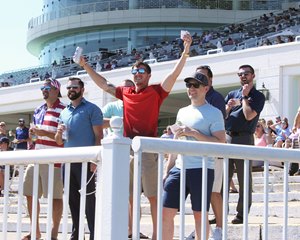Churchill Downs Claims 'Strong Proposals' for Arlington


With a vague, self-imposed deadline for offers having expired, Churchill Downs Inc. reportedly has received "strong proposals from numerous parties" to buy the property currently occupied by Arlington International Racecourse.
That unattributed statement, reported by the Arlington Heights Daily Herald, was not supported with any details or names of interested parties. The only publicly revealed bid is from a group led by former Arlington president Roy Arnold, with backing from the Illinois Thoroughbred Horsemen's Association, which aims to preserve racing at the northwest suburban Chicago track.
Any "development only" bids presumably would involve demolition of the track, including its iconic, cantilevered-roof grandstand.
Other than a mid-June target for submitting proposals, CDI has not outlined any timetable for selecting or announcing a winning bid, if there is one.
The move to sell the Arlington land started with CDI's surprise decision in 2019 not to apply for a newly approved casino license at the track. CDI officials followed that last year with an announcement to investors in the publicly traded company that they instead intended to sell the property for development.
Wild speculation about the future of the parcel has ranged from a potential move of the NFL's Chicago Bears to a new stadium there, to a lack of suitable bids, which might convince CDI to keep the track running for at least another year in 2022.
The one confirmed interested party is Arnold's. The president and CEO of a high-end lodging and hospitality firm announced June 15 his group has submitted a letter of intent outlining preservation of racing with other parts of the land used for an arena "suitable to host a minor-league hockey team" as part of an entertainment complex. Housing also is included in the plan.
Arnold said his consortium also includes major Chicago office development firm Sterling Bay, other developers, and "high-net worth individuals."
"We have the capital and the passion to make Thoroughbred racing work at Arlington Park," Arnold said in a news release. "We look forward to continuing the legacy that is Arlington."
There has been a presumption among local horsemen, however, that CDI won't sell to anyone who seeks to continue racing. Arlington Heights, responding to that sentiment, recently passed an ordinance prohibiting CDI from inserting any no-gaming clause in a sales agreement, figuring a successful continuance of racing might require a supplemental income stream such as gaming revenue.
In any event, the deadline for applying for a casino license at the track expired long ago and legislative approval would be required to reopen that window. Even in the unlikely event that hurdle were cleared, new owners would need approval from the Illinois Gaming Board which, two full years after passage of enabling legislation, has yet to issue a license for any of the six newly authorized non-track casinos.
There also is some skepticism, even among horsemen, that continued racing at Arlington without a casino would be a winning bet. Absent new gaming revenue, horsemen are hard-pressed to imagine running for more than the current $120,000 to $150,000 a day in purse money. With Arlington closed and racing conducted full-time at casino-fueled Hawthorne Race Course, purses would be expected to be significantly higher.
That raises the question: Which is more important, significantly higher purses or the Arlington "mystique?"
A further complication is the need to provide for the struggling Illinois harness horsemen. The 2019 gaming law expansion also authorized a racino for Standardbreds in the south Chicago suburbs but the only plan that has surfaced for that facility fell through when the state refused to sell the land on which it would be located.
If Hawthorne were the only remaining Chicago-area track, harness and Thoroughbred racing would compete for dates.
